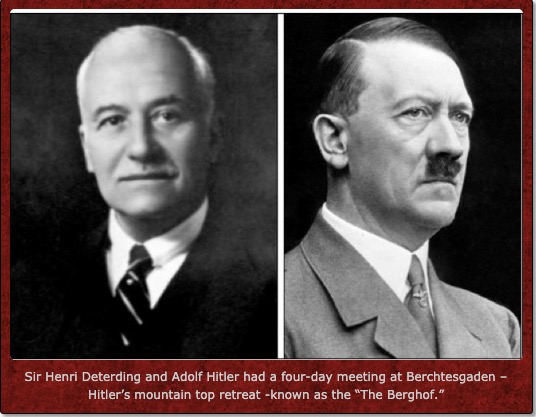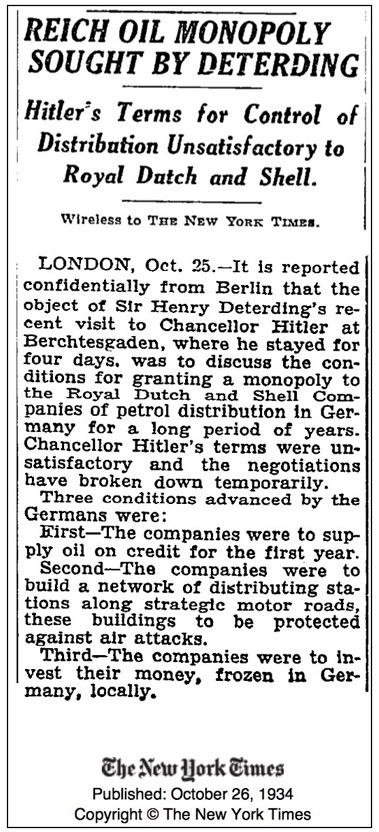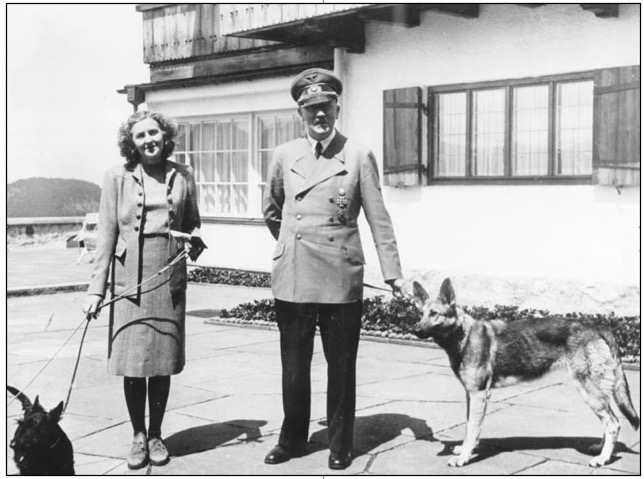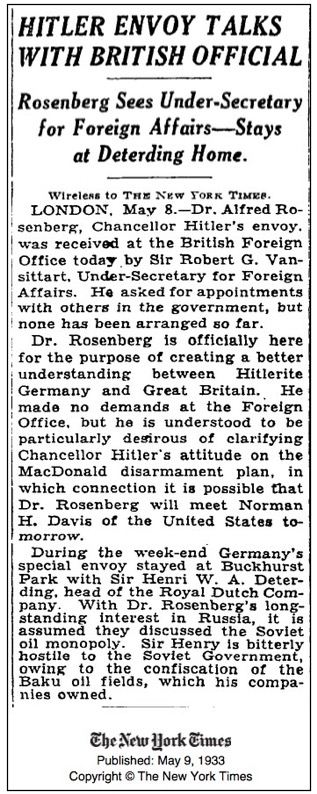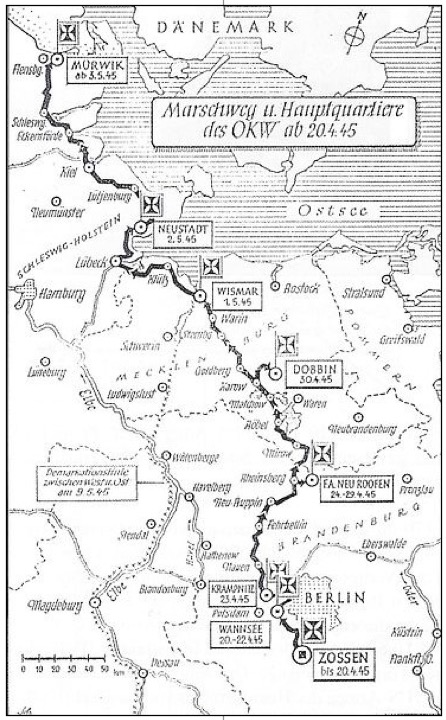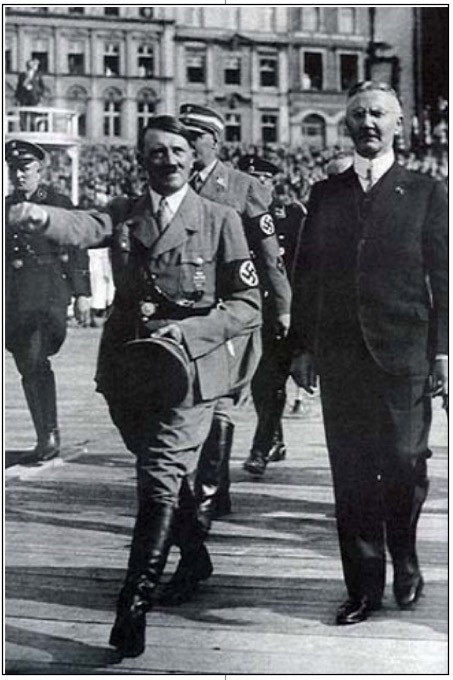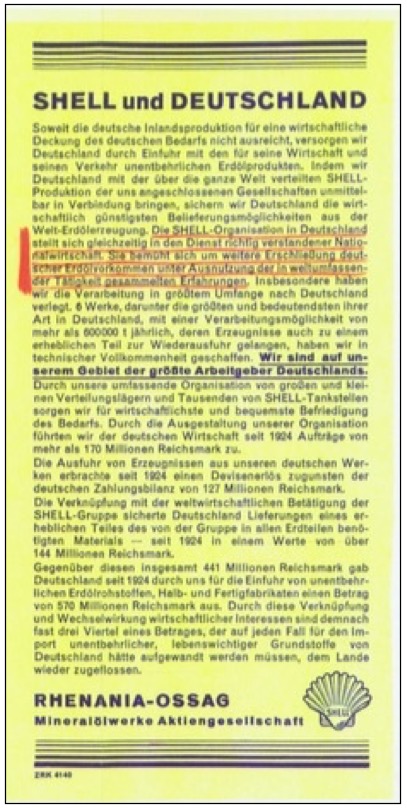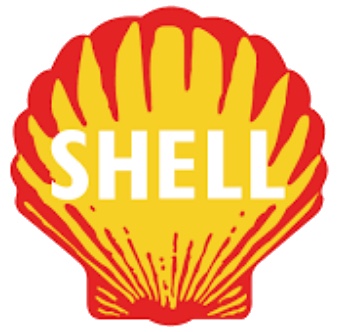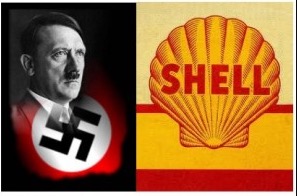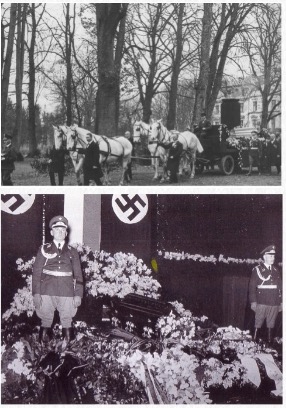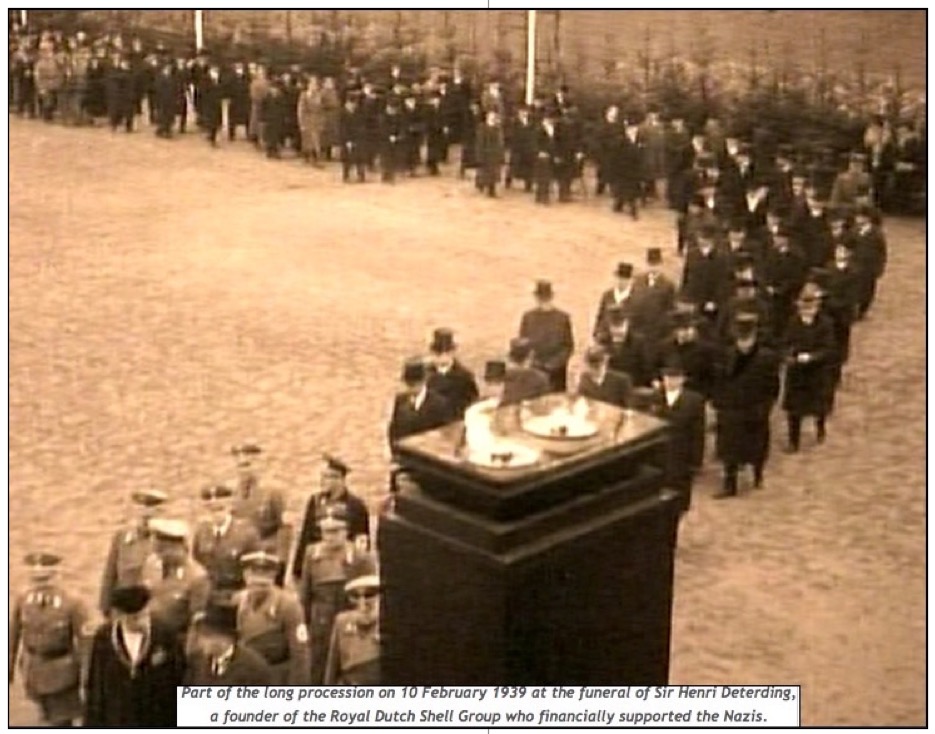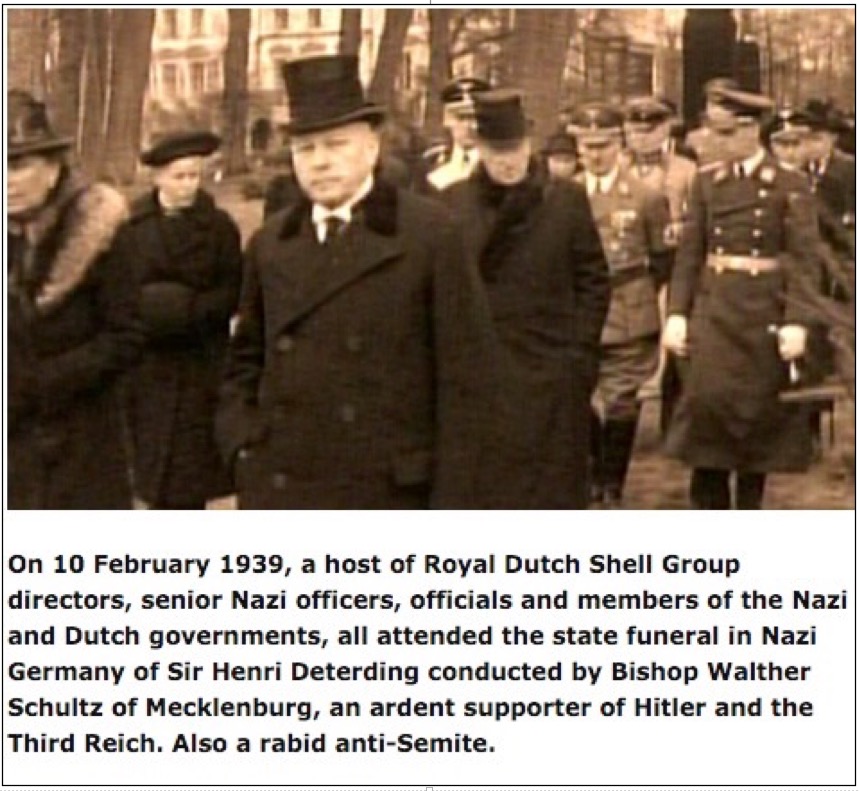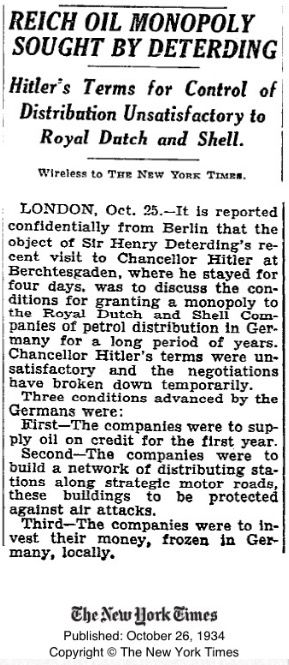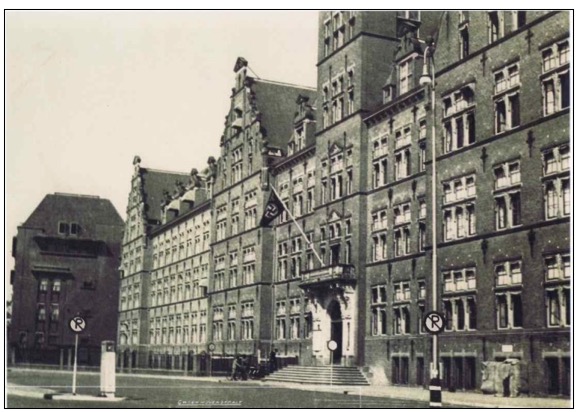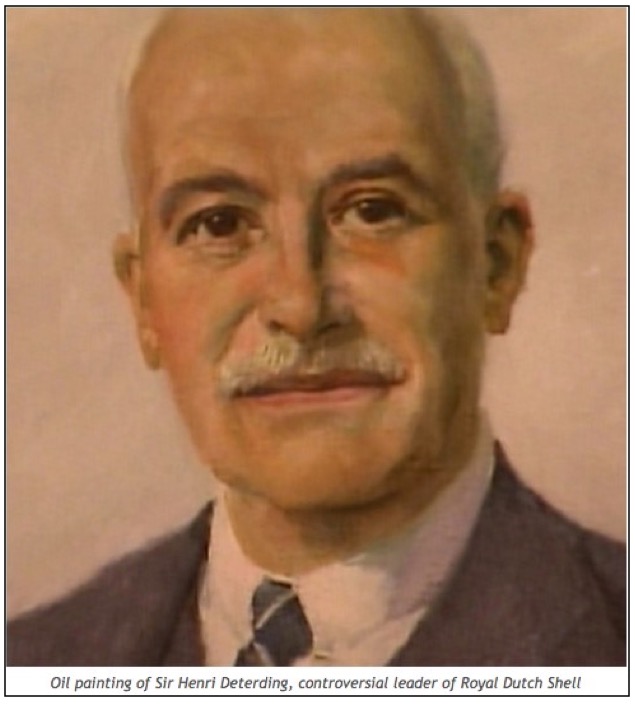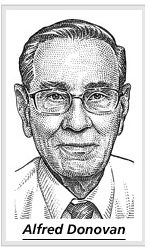Shell’s historians downplayed the relationship between Hitler and Deterding. As far they are concerned, the two never met. They said that a request by Sir Henri for a meeting with Hitler in March 1933 was rebuffed and disregarded Deterding’s claim that he met with Hitler in November 1933. Not only were there meetings. Deterding “was revered and ultimately mourned by Hitler.”
Shell’s historians portrayed the relationship between Deterding and Hitler as standoffish on the part of Hitler, with all of Deterding’s attempts to meet with him being rebuffed. See pages 481 to 485 of RDSH V1.
On page 483 they say that in March 1933 “Deterding was turned down without further ado” when he requested a meeting with Hitler.
A statement attributed to Deterding on page 477 that he met with Hitler in November 1933 was dismissed as being a mere “claim.” It is the same as saying that Sir Henri was a liar.
I can only surmise that their research did not discover a syndicated newspaper article, as I was able to do, from October 1934, reporting that Deterding was the guest of Hitler during a four-day meeting in Germany.
Based on what Deterding said and also taking into account the newspaper reports a year later, far from being rebuffed, Deterding met with Hitler on a number of occasions and was held in high esteem.
Information from a New York Times article, published on 26 October 1934 under the headline:
“REICH OIL MONOPOLY SOUGHT BY DETERDING”:
The above article with the sub-headline: “Hitler’s Terms for Control of Distribution Unsatisfactory to Royal Dutch and Shell,” reported the content and outcome of the four day summit meeting between Hitler and his guest, Sir “Henry” Deterding, held at Berchtesgaden, – Hitler’s mountain top retreat known as the “The Berghof.”
CONTENT OF THE NEW YORK TIMES ARTICLE:
LONDON, Oct. 25.-It is reported confidentially from Berlin that the object of Sir Henry Deterding’s recent visit to Chancellor Hitler at Berchtesgaden, where he stayed for four days, was to discuss the conditions for granting a monopoly to the Royal Dutch and Shell Companies of petrol distribution in Germany for a long period of years. Chancellor Hitler’s terms were unsatisfactory and the negotiations have broken down temporarily. Three conditions advanced by the Germans were:
First-The companies were to supply oil on credit for the first year.
Second-The companies were to build a network of distributing stations along strategic motor roads, these buildings to be protected against air attacks.
Third-The companies were to invest their money, frozen in Germany, locally.
Deterding attended the meeting on behalf of the Royal Dutch Shell Group with the objective of securing a long-term monopoly position for Shell in German petrol distribution and retailing.
Shell subsequently offered to supply oil to Nazi Germany on long-term credit and did invest substantial funds in its German subsidiary projects. Perhaps part of its important contribution to the German economy that Shell boasted about on Nazi German road maps.
The Montreal Gazette and The Daily Gleaner also reported the same news story. There was no subsequent retraction or correction by any of these newspapers.
(Photo below from Wikipedia Commons: Adolf Hitler and Eva Braun with their dogs at the Berghof.)
There was a lot to discuss at the meeting. Hitler and Deterding shared an intense common interest in Russia, including the Russian oil fields. Both hated communism. The New York Times had reported just a few months earlier that Deterding wanted to destroy communism in Russia. The same article also reported on the parlous state of the German economy.
Deterding’s objective of securing oil contracts by currying favour with Hitler was mentioned in an article published by Time magazine over a year earlier, on May 1933.
That same month, Dr Alfred Rosenberg, Hitler’s envoy, according to a New York Times article, stayed as a guest at the Buckhurst Park home of Deterding in England.
On 13 September 1935, a U.S. newspaper, the Meriden Record, published an article from which this telling extract is taken:
“Deterding now enjoys a monopoly in the Nazi state.”
“Europe’s Oil Napoleon” as they aptly described him, had apparently achieved his objective.
The Deterding/Hitler summit, in combination with the personal message sent by Hitler to the funeral of Sir Henri, confirms a very special relationship between Hitler and Deterding. Hitler expressed genuine appreciation of the support he and Nazi Germany had received.
The fact that Dr. Georg Bell had already acted as a joint agent for Hitler and Deterding, is further evidence of a close trusting relationship. Bell was murdered after making indiscreet revelations about Deterding and Hitler.
Thus the true history of the relationship between Deterding and Hitler is very much at variance with the picture painted in “A History of Royal Dutch Shell.”
Deterding was not kept at arm’s length. The conclusion by Shell’s historians on the subject was based on a false premise.
Only an honoured personal guest would be rewarded with a private four-day meeting at Hitler’s mountain top retreat.
In contrast, British Prime Minister Neville Chamberlain’s face-to-face meeting on 16 September 1938 with Hitler at Berchtesgaden, in an attempt to avoid war, lasted for just three hours.
The meeting between Hitler and Deterding in October 1934 took place just a few months after the infamous Night of the Long Knives and the death of Germanys President, Paul von Hindenburg, events which consolidated Hitler’s ascension to undisputed power.
CASTLE DOBBIN HQ OF SENIOR NAZIS
Further evidence of the high regard Adolf Hitler had for Sir Henri Deterding comes from a former senior Nazi officer who held the top post in German bomber command.
It provides independent evidence of a million Reich marks donation given to the Nazi by Sir Henri.
 On 28 April 1945, Lieutenant-Colonel Werner Baumbach,“General of the Bomber”(photo shown right), arrived at a country house located near Krakow in Mecklenburg, north of Berlin. He had a meeting with Heinrich Himmler, Reichsführer of the SS, the overseer of the concentration camps and extermination camps.
On 28 April 1945, Lieutenant-Colonel Werner Baumbach,“General of the Bomber”(photo shown right), arrived at a country house located near Krakow in Mecklenburg, north of Berlin. He had a meeting with Heinrich Himmler, Reichsführer of the SS, the overseer of the concentration camps and extermination camps.
It soon became apparent to Baumbach, after two portraits in silver frames were drawn to his attention, that the country house in which the SS was located was once the home of Sir Henri Deterding.
The first portrait, signed by Hitler, contained the following inscription:
Sir Henry Deterding – in the name of the German people, for your noble donation of a million reichs-marks.
Adolf Hitler
The second portrait was of Reichsmarschall Herman Göring, Commander in Chief of the Luftwaffe.
The inscription said:
To my dear Deterding, in gratitude for your noble gift of Rominten Hunting Lodge.
Your Hermann Göring
Göring’s hunting lodge at Rominten, in East Prussia, was known as “The Reichsjägerhof.”
Göring frequently visited the vast Castle Dobbin estate to go hunting with Deterding.
In an extraordinary act of friendship (or for less noble purposes) Deterding had given Göring the Rominten Hunting Lodge (in the Romincka Forest of East Prussia) as a gift. Kaiser Wilhelm II once owned it. As previously mentioned, Göring sent a wreath to the Nazi funeral of Sir Henri, his generous benefactor.
 The information about Werner Baumbach comes from pages 235 and 236 of his book: “The Life and Death of the Luftwaffe”, first published in 1949 and translated into English in 1960.
The information about Werner Baumbach comes from pages 235 and 236 of his book: “The Life and Death of the Luftwaffe”, first published in 1949 and translated into English in 1960.
It is a passing reference consisting of a few paragraphs from a book devoted to telling “the story of an officer who served his country with distinction and risked reprisals to speak his mind.“
It does, however, provide historically important impartial evidence confirming Deterding’s financial support for the Nazis.
According to the book, Baumbach “spent nearly six months in an English interrogation camp. He was told that he would be charged as a war criminal on the ground that he had fired on shipwrecked people. After unending cross-examination and investigation Baumbach was able to prove conclusively that throughout the war neither he nor any unit under his command had committed any violations of the Hague Convention.”
In 1936, Deterding purchased from Queen Wilhelmina of the Netherlands the estate on which the palatial country house known as Castle Dobbin in Mecklenburg was located. At the time, Sir Henri was a director of multiple Royal Dutch Shell group companies and held a controlling shareholding in the Group.
The property remained in the hands of the Deterding family until 1945. As can be seen on the featured map from1945, Dobbin was located North of Berlin. The area is now known as Dobbin-Linstow, a district of Rostock in Mecklenburg-Vorpommern.
Deterding paid 1,050,000 Reich mark for the vast estate, which included Castle Dobbin.
Sir Henri moved into Castle Dobbin with his young German wife, Charlotte-Minna Knaack, his own former secretary and fanatical Nazi, said by one source to also be a former private secretary of Hitler.
Heinrich Himmler, General Alfred Jodl, Chief of the Operations Staff of the Armed Forces High Command, and Field Marshal Keitel were all stationed at Dobbin Castle in the latter stage of WW2.
On 29 April 1945, HitlFW: Fw: It Was a Revolutioner sent a final message from his Berlin bunker. It was dispatched to Field Marshal Keitel based in the same country house, still owned by the Deterding family.
Deterding was buried at the Dobbin Estate with the elaborate official Nazi ceremony already highlighted. His widow had his body exhumed from Germany in the 1960s and moved to Vaduz, the capital of Liechtenstein.
Hjalmar Schacht (“Hitler’s Banker”
Dr. Hjalmar Schacht, the imposing gentleman, seen walking to the right of Hitler (the photo below), served in Hitler’s government as President of the Reichsbank, Minister of Economics and Plenipotentiary General for War Economy.
Schacht was a central figure in Germany’s rearmament program and the steps which he took, particularly in the early days of the Nazi regime, were responsible for Nazi Germany’s rapid rise as a military power.
The above information comes partly from an illuminating Wikipedia article about him and from Volume VII of Trials of War Criminals Before The Nuernberg Military Tribunals – “The I.G. Farben Case. (1,616-page document so takes a while to download. Above extract in italics is from page 235).
Hjalmar Schacht was not one of Hitler’s blindly devoted henchmen. He eventually became disillusioned with the Hitler regime.
There is also a significant reference to Hjalmar Schacht in a book authored by Eugene Davidson in 1966 under the title: “The Trial of the Germans: Account of the Twenty-two Defendants Before the International Military Tribunal at Nuremberg.”
The book is described as the definitive one-volume study of the Nuremberg trials.
One of the footnotes on page 229 is about businessmen being solicited for financial support of the Nazis:
“Some support of Hitler came from foreign countries. The Dutch oil magnate Henri Deterding, who had an estate in Mecklenburg, made sizable contributions.”
According to chapter footnote, 19 on page 257, Hjalmar Schacht gave this information during an interrogation on 31 July 1947 in his trial before the International Military Tribunal at Nuremberg. Charged with “crimes against peace” he was later acquitted.
It provides evidence directly from “Hitler’s Banker” that Deterding made substantial contributions to the Nazi coffers.
I found some related information in a book by Sol Bloomenkranz published in July 2012 under the title “Charles Bedaux – Deciphering An Enigma.” (Charles Bedaux, a French millionaire, was an adventurer and former economic advisor to the Third Reich.)
From page 49
Sir Montagu Normal, a Governor of the Bank of England, was a close friend of Hjalmar Schacht. Montagu and Sir Henri Deterding were both business leaders supportive of Nazi Germany.
From footnote 75 in the book:
“Sir Henri Deterding (1866-1939) donated millions in fuel to the Third Reich.”
Related information is sourced from pages 33 and 34 of a book by Curt Riess published in 1944 under the title: “THE NAZI GO UNDERGROUND”:
Montagu Norman, the pro-Nazi former governor of the Bank of England, was the closest lifetime friend of Hjalmar Schacht.
In 1932, there was a meeting between Montagu Norman and Sir Henry Deterding in the USA when they “discussed subsidies for the Führer and possible ways of aiding him if he came to power.”
A related brief comment attributed to Adolf Hitler is printed below, together with a translation.
It comes from Monologues Führerhauptquartier 1941-1944 (aka Hitler’s Table Talk) by German historian Werner Jochmann.
Hitler’s Table Talk is the title given to a series of World War II conversations and monologues delivered by Adolf Hitler, transcribed from 1941 to 1944. (Information from relevant Wikipedia article says that the work is considered to be authentic although contentious issues remain.)
Hitler made the brief comment in January 1942 in “the Wolf’s Lair” when talking about gasoline and Goering’s Four Year Plan that Hjalmar Schacht is said to have opposed after he had begun to lose favor with Hitler:
HITLER’S BRIEF COMMENT
Hinter Schacht stand Deterding, ich möchte wissen, wer da nicht bestochen war!
Translation
Behind Schacht was Deterding, I want to know who it was not bribed!
It is unclear what the latter part of Hitler’s claimed comment meant, but the first words imply that Sir Henry Deterding was supporting “Hitler’s Banker.”
There is evidence of further direct contact between Deterding and Schacht. On page 477 of RDSH V1, it states in reference to Sir Henri Deterding:
In May 1933 he discussed synthetic gasoline and monetary policy with Reichsbank President Hjalmar Schacht.
It was clearly thought at the time that the support was financial. Shell’s retained historians said on pages 481 and 483 of RDSH V1:
“a great deal of public speculation went on about Deterding giving loans or donations, for amounts ranging from four million guilders to a fantastical £55 million, to the Nazi movement. In return, he was rumoured to have obtained promises of special advantages for the Group or even an oil monopoly under a Nazi regime. Such rumours circulated as early as 1931. They regularly resurface even today, but remain unsubstantiated.”
Spin is evident from the inclusion of the description “fantastical.”
They dismissed as “rumours” and “public speculation” Deterding’s “loans or donations” to “the Nazi movement.” (See comments on pages 481/483 RDSH V1)
Shell’s historians completely undermined their verdict on the issue by stating in the opening sentence of page 485 of RDSH V1:
Deterding’s financial support for the Nazis appears to have begun during his retirement in Mecklenburg, where he developed close ties with the local party organization and contributed to its charities.
The highlighted words constitute a significant admission that Deterding did give financial support to the Nazis. His financial support started before his retirement as DG, which was voluntary. (Shell’s historians admit that there is no evidence that Deterding was forced to retire as DG. See page 486 RDSH V1.)
When he gave the admitted financial support after his retirement as DG, he was still a director of multiple Shell group companies; was still active in company matters (as Shell historians put it, he “continued to meddle in Group affairs…”); and still held shares giving him a measure of control over the Group, as already explained.
He was still intervening on Boxing Day 1938 just forty days before his death. See pages 486 and 488 RDSH V1.
Ian Cummins and John Beasant, the joint authors of the book “SHELL SHOCK THE SECRETS AND SPIN OF AN OIL GIANT” delivered an unambiguous conclusion about the relationship between Sir Henri and Hitler. They described Deterding as “a hardline Nazi revered and ultimately mourned by Hitler.” (Page 110 of their book). They were not in the pay of Shell and their verdict is totally in accordance with the evidence.
Summary
Contrary to the spin by Shell’s historians, there is overwhelming evidence that Deterding was not held at arm’s length from Hitler. The evidence confirms a strong relationship between Deterding and Hitler, with Shell’s leader being a welcomed friend of the Nazis and a financial supporter.
Particularly bearing in mind:
- Deterding’s meeting with Hitler in November 1933, which Shell’s historians seem to have dismissed as a figment of his imagination.
- The international news reports of the Deterding/Hitler four-day summit in October 1934.
- The multiple reports that Deterding and Hitler used a joint agent to represent them.
- The admission by Shell’s historians that Sir Henri remained active in Group affairs after his retirement as DG and did give financial support to the Nazis.
- The impressive tribute from Hitler on behalf of the German people on the wreath Hitler sent to Deterding’s funeral.
- Information from an independent source about Hitler’s stirring tribute to Sir Henri as inscribed on the portrait displayed at Deterding’s former German mansion.
- The specific acknowledgement in that tribute of a major donation from Sir Henri.
- The unambiguous evidence from Hjalmar Schacht, given under interrogation, of the sizable contributions, received from Sir Henri Deterding.
- The verdict reached independently by Ian Cummins and John Beasant that in fact, Hitler revered Deterding.
There is no question that Shell, as a company, despite some misgivings at the Dutch HQ, publicly highlighted the importance of Shell’s financial contribution to the German national economy (after the Nazis came to power).
Shell’s historians acknowledged this in red text on page 470 of RDSH VI:
Late in 1933 Rhenania set up an information office for motorists and launched a large series of motorists’ touring maps, emphasizing – despite some political doubts from The Hague – the importance of Shell as a contributor to the German economy.
It is a history of mutual admiration between two megalomaniac dictators with a personal relationship, working together to advance shared objectives, some of which benefitted Shell. That is the truth, as opposed to the spin.
(In the 1930s Shell’s German subsidiary, Rhenania-Ossag Mineralölwerke AG, reportedly issued a vast range of maps, unsurpassed in number by any other petrol company globally.)
TRANSLATION OF RHENANIA-OSSAG ROAD MAP TEXT
SHELL and GERMANY
If domestic production is not sufficient to cover demand economically, we supply Germany by importing the petroleum products which are vital for its economy and transport. By bringing Germany into direct contact with the SHELL products marketed all over the world by our Group companies, we guarantee Germany the economically most favourable supplies from world oil production. At the same time the SHELL organisation in Germany places itself at the service of the national economy in the proper meaning of the word. It endeavours to increase German oil reserves by making use of the experience it has gained through its activities all over the world. In particular, we have largely shifted processing to Germany. We have created six plants, including the largest and most important of their nature in Germany, which are technically cutting edge and have a processing capacity of more than 600 000 t per annum, a large proportion of whose products are re-exported. In our sector we are Germany’s largest employer. Our comprehensive organisation of large and small distribution centres and thousands of SHELL filling stations ensures that demand is met in the most economical and most convenient way. Thanks to the way in which our organisation is structured we have given the German economy orders in excess of 170 million Reichsmark since 1924.
Since 1924 exports of products from our German plants have given the German economy foreign currency earnings amounting to 127 million Reichsmarks to help the balance of payments.
Access to the worldwide activities of the SHELL Group has guaranteed Germany supplies of a considerable proportion of the material required by the Group in all parts of the world – to the value of 144 million Reichsmarks since 1924
Offsetting this total of 441 million Reichsmarks, Germany has spent – through us – 570 million Reichsmarks since 1924 on essential petroleum products, semi-finished and finished goods. This interplay of economic interests has returned to Germany almost three-quarters of the sum which Germany would have had to spend on importing essential, vital base materials.
RHENANIA-OSSAG
Mineralölwerke Aktiengesellschaft
ENDS
Copyright Notice: All rights, including copyright and compilation in the content of shellnazihistory.com web pages authored by John Donovan, are owned or controlled for these purposes by him. In accessing the said web pages, you agree that you may only download the content for your own personal non-commercial use. Except where expressly stated otherwise, you are not permitted to copy, broadcast, download, store (in any medium), transmit, show or play in public, adapt or change in any way the content of these web pages for any other purpose whatsoever without the prior written permission of John Donovan via the email address: john@shellnews.net
shellplc.website and its sister non-profit websites royaldutchshellplc.com, royaldutchshellgroup.com, shellenergy.website, shellnazihistory.com, royaldutchshell.website, johndonovan.website, shellnews.net and shell2004.com are owned by John Donovan. There is also a Wikipedia feature.